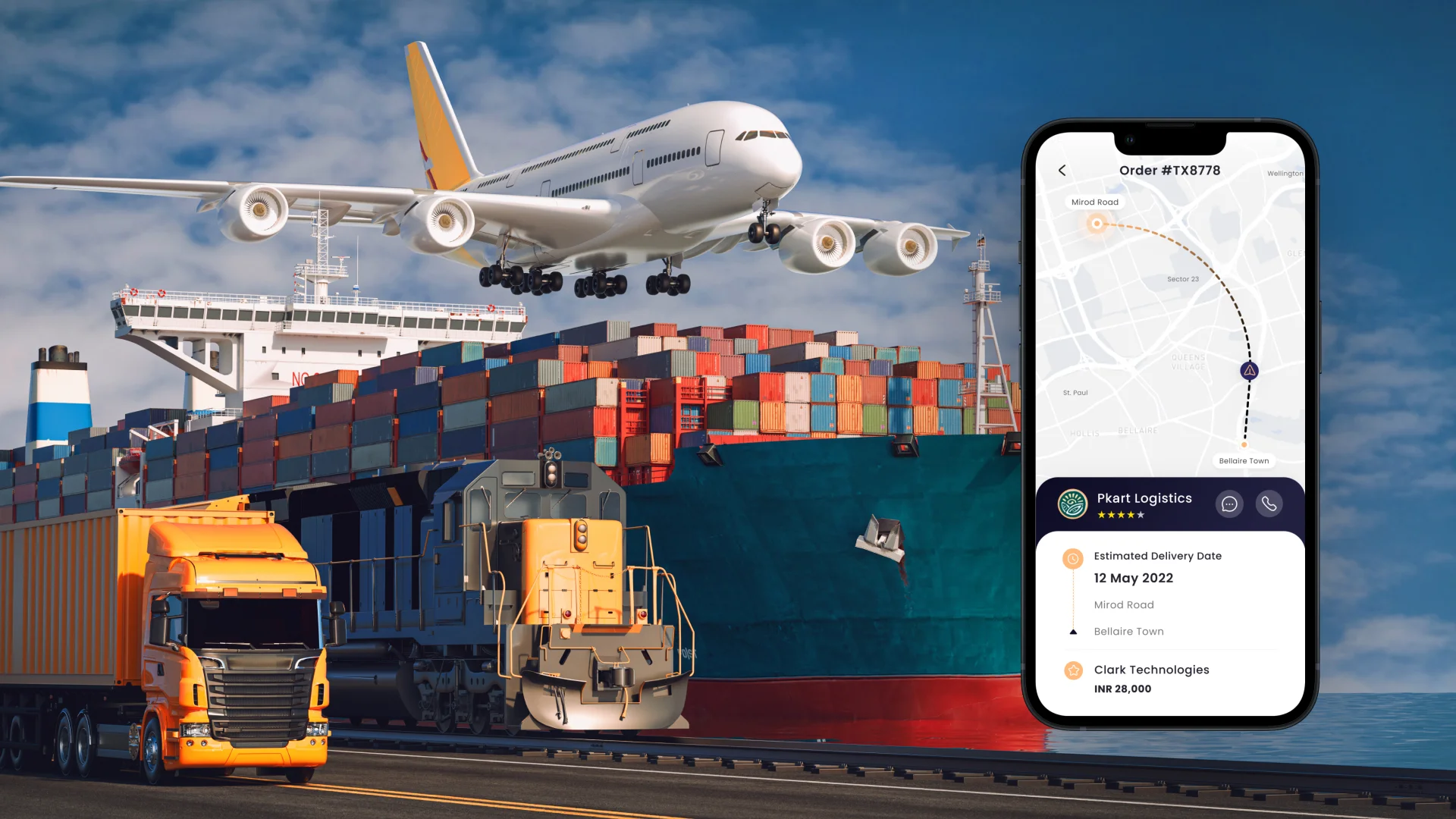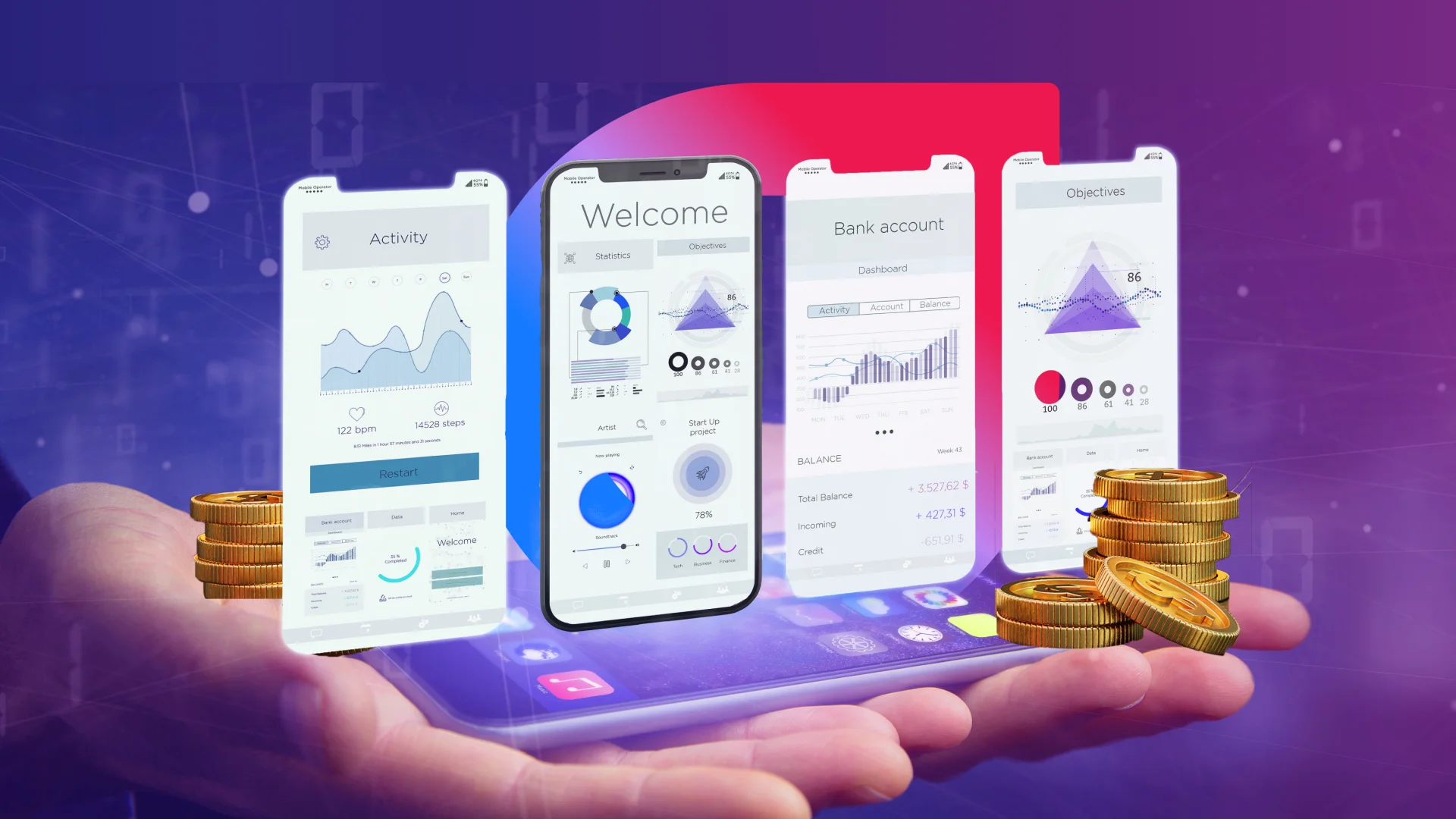Key Benefits of Having a Mobile App for Your Logistics Business
- Mobile
- May 7, 2023
The logistics industry has progressed by leaps and bounds widening its geographical circumference to the entire global arena. As per the stats, The global logistics market size is expected to reach around USD 18.23 trillion by 2030.
The term logistics is predominantly used in various perspectives. If one has to give a simple definition then, it is a task of managing the flow of things from the point of origin to the point of delivery. It may involve a varied number of tasks such as packing and transportation of goods and materials, warehousing, material handling, maintaining and managing the inventory or stock, the flow of information through the supply chain management, and much more.
In fact, eCommerce and even online retailers are largely dependent on logistics businesses. Therefore, whether it is shipping the cargo through courier, the movers and the packers, storing the necessary goods at a warehouse, etc. The logistics company will hugely benefit from online manufacturing industries as they would deliver the goods and products right to the doorstep within a quick time.
However, one must be aware that since the number of logistics companies is increasing in the market, so is the competitiveness. So, if you want to compete then, you have to adhere to the latest technology and the need of the hour is an attractive but user-centric mobile application. It will simplify all your tasks as you can carry out your work through a single app.
The mobile apps are just more than a boon; they help in improving a number of activities like managing the inventory, keeping an eye on the warehouse, supervising the goods carrying vehicles, and so on. So, let’s discuss the various aspects and see why the logistics company requires the support of mobile apps.
Benefits of Having Mobile App for your Logistics Company
Apart from just being a technological advancement in your logistics business, opting for logistics app development has various benefits to offer. Let us explore these benefits in detail to understand why every business in the logistics industry, regardless of the type of service they are offering, must consider custom app development.
Real-Time Tracking and Visibility
One of the major hurdles that the logistics industry faced was the genesis of technology when applications in logistics seemed distant. Today, GPS-empowered logistic operations offer all user personas an array of benefits with unparalleled control and insight into the movement of their shipments.
Here are some of the benefits that the users get real-time visibility and tracking in their logistics apps.
- Cargo/vehicle tracking
- Movement of drivers
- Tracking deliveries
- Location management
- Route optimization
- Tracking packages
Seamless Coordination
The users whether it is the drivers/dispatchers, the business owners, or customers, had to wait for the calls, or other entities to receive the calls or provide some form of information to get accurate insights into the recent developments in the logistic operations.
With presence of information in the mobile app which supports offline sync of the information, facilitates smooth coordination among drivers, warehouse staff, and clients. Smooth communication leads to fewer/no delays, minimizes errors, promotes responses, and optimizes logistic operations.
Data Analytics and Insights
As the application collects various data from shipment routes to delivery time stamps and other key performance indicators, this data can be further utilized by the business owners for data analytics by either in the inbuilt dashboard with various data visualizations or integrating with third-party analytics tools.
These data-driven insights enable the admins or business runners to gain invaluable information like demand patterns, resource allocation, cost management, strategic planning, and more. It facilitates the identification of trends, bottlenecks, and areas for improvement which would benefit the business in the following aspects:
- Fuel operational efficiency
- Adjustments to logistics strategies
- Optimizing resource allocation
- Minimizing delays
- Cost-effectiveness
Supply Chain Optimization
The flow of goods from point A to point B is a process with many aspects involved. It is the effective and timely functioning of these aspects like routes, inventory, and other resources and involved stakeholders that facilitates the smooth flow.
Logistic software development would benefit the supply chain in the following aspects:
- Improved efficiency
- Enhanced visibility
- Real-time tracking
- Inventory management
- Predictive analysis
Less Paper More Automation
In manual record keeping, there is always room for errors, unnecessary delay in the process, ineffective stakeholder collaboration, inconsistent records, and also the environmental impact that follows.
Here are some of the results of automation in logistics operations:
- Reduced error rates
- Environmental sustainability
- Cost savings on paper and printing
- Enhanced operational efficiency
- Streamlined order processing
Reduced Cost and Energy
From the predictive analysis of fuel consumption to route optimization and real-time tracking of the fleet enables the logistics business runners to cut costs in various aspects according to their optimization strategies.
Logistics app development provides the following reduced cost and energy benefits:
- Optimization of routes
- Efficient resource allocation
- Minimized energy consumption
Quick and Accurate Processing
Accessing the information of deliveries on mobile, tablet, or any of the devices the stakeholders prefer enables them to make quick decisions and eliminates the need for paper and manual work when processing orders.
With custom logistics app development, here are some additional benefits gained from quick and accurate order processing:
- Instant order confirmation
- Faster order processing/fulfillment
- Reduced processing errors
- Improved order accuracy
- Streamlined inventory management
- Automated data entry
Efficient Fleet Management
The heart of logistics operation is its fleet. However, managing it is a huge task given various factors that may affect the functioning and performance of the vehicle. Technologies like RFID/NFC technologies or QR codes would enable the stakeholders to monitor and track the cargo.
Here are some of the benefits which result in efficient fleet management.
- Real-time fleet monitoring
- Transparency of transportation
- Preventive maintenance scheduling
- Improved resource utilization
- Timely deliveries
- Reduced transit times
- Extended fleet lifespan
Effective Warehouse Management
Warehouses hold a crucial place in the entire supply chain, from the storage of the parcels to their movement within the warehouses, and more. Having insight into warehouses provides business owners with timely deliveries, optimizing storage space, and more.
Here are some aspects of efficient warehouse management that are achieved with a logistics app:
- Real-time stock-level visibility
- Real-time inventory tracking
- Intelligent warehouse layout planning
Regulatory Compliance
One thing that every business owner wants to dodge regardless of the industry or business segment is the fines and penalties that are a result of regulatory complaint issues.
The following are some of the aspects that the logistic app development facilitates resulting in unmatched regulatory compliance.
- Improved documentation
- Enhanced data accuracy
- Automated compliance checks
- Timely alerts and notifications
- Increased accountability
- Regulatory updates integration
- Streamlined audits
Online Booking
A logistics app changes the ways logistics operations work, from phone calls to making it easy for all the user personas to enter their information right from the devices they have translating it into transparent visibility and easy accessibility of information or features/functionalities.
Here is how logistics app development makes online super handy:
- 24/7 accessibility
- Instant confirmations
- User-friendly interface
- Reduced errors
Improved Productivity
The combined effect of all the above benefits results in an increase in overall productivity in logistics operations enabling your logistics business to increase transparent communication and visibility in the supply chain process.
Here are some of the benefits achieved with increased logistic operational productivity:
- Reduction in manual tasks
- Faster decision-making
- Minimized delays
- Optimized workflows

Unlock Logistics Excellence with MindInventory
Specializing in the development of cutting-edge technological solutions, MindInventory stands out as a reliable partner for logistics app development.
The expertise extends to the fleet, inventory, shipping logistics, delivery management software development, and more, where MindInventory crafts solutions that empower businesses to meet various logistics business requirements.
With a commitment to innovation and a client-centric approach, developers at MindInventory are experienced in providing tailored app development solutions that address the complexities of delivery, fleet, and inventory management.
Our proficiency in addressing integration challenges, scalability requirements, and compliance with regional regulations positions us as valuable collaborators.
In essence, MindInventory offers end-to-end support, from conceptualization to deployment, making it a trusted partner for companies seeking to revolutionize their logistics operations through custom app development.
FAQs
From route optimization to predictive analytics, delivery forecasting, smart inventory management, and more, AI can be implemented in various aspects of the logistics business operation to enhance the benefits of logistics app development a step further.
Apart from implementing technology solutions, some of the best ways to improve your logistics business operations are by adopting a customer-centric approach, focusing on sustainability, streamlining communication, and more.
Some of the major challenges that you may face in custom logistics app development are data security, real-time connectivity, cross-platform compatibility, scalability, and more.
IoT can be used in logistics in ways like asset tracking through GPS-enabled sensors, monitoring the condition of goods in transit (such as temperature-sensitive items), and optimizing route planning using real-time traffic data. Further, attaching smart sensors on vehicles, containers, and inventory enables efficient inventory management, reducing stockouts and overstock situations.













